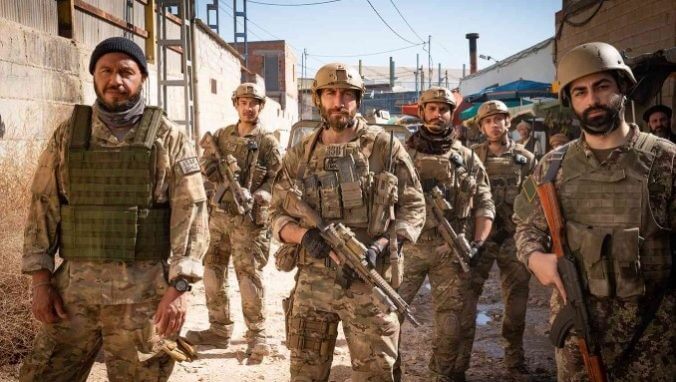Guy Ritchie’s The Covenant Is A Major Departure–From What Guy Ritchie Is Good At
Movies Reviews Guy Ritchie
Since returning from his extended sojourn to the dark heart of big-studio blockbusters, British filmmaker Guy Ritchie has seemed content to perform prolific experiments with the ingredients of what might have once been considered the patented Guy Ritchie formula: Tough talk, U.K. criminals, smatterings of comic violence, smirky button-pushing, movie stars in outlandish guises. In quick succession, he made The Gentlemen, a self-referential, self-conscious Return to Form; Wrath of Man, a grittier, nastier, less jokey version; and Operation Fortune, which applied the Ritchie basics to a breezier caper plot.
All of these movies are novel variations on his early work, but The Covenant represents Ritchie’s biggest departure from that comfort zone since Aladdin–and at least the fictionalized Middle East of Aladdin still featured a charming, light-footed thief. The new movie takes place largely in late-2010s Afghanistan, as soldier John Kinley (Jake Gyllenhaal) navigates a forever battlefield with the help of locally based interpreter Ahmed (Dar Salim); any early macho camaraderie turns far grimmer than the laddish vibes of Lock, Stock, and Two Smoking Barrels. Maybe that’s why the film’s marketing and on-screen title is actually Guy Ritchie’s The Covenant; the fanbase wouldn’t pick up on it otherwise. It might also be a practical move to distinguish the film from the Screen Gems 2000s-era cheapie of the same name; at one point, the film was also called The Interpreter, running up against a Nicole Kidman thriller of a similar vintage.
The unwanted references to movies from 20 years ago are nonetheless appropriate for a movie that, aesthetically and thematically (and despite its timeline placement further into U.S. occupation of Afghanistan), feels like a leftover from that era’s spate of then-contemporary Middle East war movies. The character dynamics are certainly familiar: The exacting and rigorous Kinley forms a reluctant alliance with Ahmed before the two men earn each other’s respect. Ahmed has accepted a dangerous job with the promise that he and his family will be granted U.S. visas and asylum when his tour is complete. When one of the squad’s missions to locate and halt Taliban weaponry hot-spots goes violently sideways, Ahmed goes above and beyond to save Kinley’s life. Kinley makes it back to the U.S. alive–only to discover that the government has not fulfilled its promise to Ahmed, whose family is now on the run from the Taliban. Incensed by the injustice and wracked with a brutal PTSD/guilt combo, Kinley makes it his business to get Ahmed to safety, even if it means putting himself back in danger.
Ritchie, then, has arrived at a middle-of-the-road policy-failure frustration that animates so many of this movie’s predecessors: Respect the sacrifice of the troops, fume over the way they’re treated, acknowledge the hardships of the Afghanistan locals. The latter gets a little more play here with the focus on Afghan translators whose betrayal at the hands of the government feels emblematic of the 20-year occupation. It’s a perfectly valid concern–still expressed, though, primarily through the eyes of an American soldier. Ritchie’s film is less infatuated with displays of All-American bodily sacrifice than movies like Lone Survivor and 13 Hours, but it still keys into a kind of performative, manly anguish.
Strangely, it’s Gyllenhaal’s presence that exacerbates this feeling, even moreso than the standard directorial pyro. Though he’s a versatile performer–capable of comic dexterity, romantic woundedness, and dramatic intensity–over the past decade, he has repeatedly circled back to sweaty displays of macho self-torture. The Covenant offers another opportunity for Gyllenhaal to sweat, scream, and bug out his eyes, just like he did in Southpaw, The Guilty and Ambulance, as if he’s on a years-long audition for the hottest Hollywood-depicted military tragedy of 2002. (At this point, he seems more haunted by his inability to book Black Hawk Down than by any of the horrors his characters keep witnessing.) This strategy works best stateside, as his frustration lathers into rage during endless phone calls with the U.S. bureaucracy, giving us a new angle on a military quagmire.
During the actual battle scenes, though, when Ritchie’s kinetic talents should feel more at home, Gyllenhaal, Salim and The Covenant get lost in noisy visual clichés: the washed-out color scheme, the distorted handheld close-ups, the haunted-tilt look in Gyllenhaal’s eyes. It’s a lot of Ritchie moves without any of the fun, dutifully withheld because The Covenant is supposed to be serious business. Yet the movie isn’t too serious to avoid a razzle-dazzle action climax where a bunch of anonymous Taliban soldiers get blown to hell, a righteous triumph enabled by Kinley acting as a de facto contractor rather than a soldier. Some earlier sequences hew closer to the ground-level grit that Guy Ritchie’s The Covenant seems to be aiming for. Mostly, though, the movie reveals the surprising degree to which Ritchie’s most recognizable traits as a filmmaker, for better or worse, come from his screenplays as much as his flashy direction. Here, working from such familiar modern-warfare sentiment, his flash-bang technique becomes just another Hollywood grunt.
Director: Guy Ritchie
Writer: Guy Ritchie, Marn Davies, Ivan Atkinson
Starring:: Jake Gyllenhaal, Dar Salim, Antony Starr, Alexander Ludwig
Release Date: April 21, 2023
Jesse Hassenger is associate movies editor at Paste. He also writes about movies and other pop-culture stuff for a bunch of outlets including Polygon, Inside Hook, Vulture, and SportsAlcohol.com, where he also has a podcast. Following @rockmarooned on Twitter is a great way to find out about what he’s watching or listening to, and which terrifying flavor of Mountain Dew he has most recently consumed.